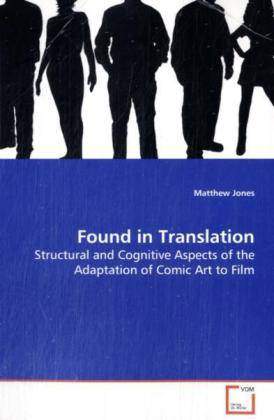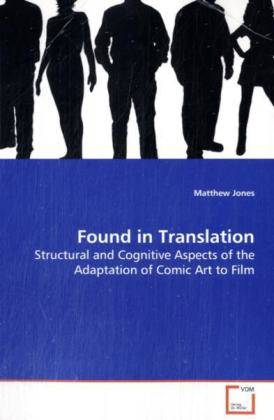
Door een staking bij bpost kan je online bestelling op dit moment iets langer onderweg zijn dan voorzien. Dringend iets nodig? Onze winkels ontvangen jou met open armen!
- Afhalen na 1 uur in een winkel met voorraad
- Gratis thuislevering in België vanaf € 30
- Ruim aanbod met 7 miljoen producten
Door een staking bij bpost kan je online bestelling op dit moment iets langer onderweg zijn dan voorzien. Dringend iets nodig? Onze winkels ontvangen jou met open armen!
- Afhalen na 1 uur in een winkel met voorraad
- Gratis thuislevering in België vanaf € 30
- Ruim aanbod met 7 miljoen producten
Zoeken
Omschrijving
This book seeks to explore how film adaptations of comic art are constructed and received. Through an analysis comparing different types of comic-to-film adaptations selected from a nearly comprehensive list, a set of adaptive operations was discovered based upon the narrative and stylistic relationships between film adaptations and comic art source materials. Depending upon which operations are used, adaptations may be classified as predominately structural or thematic. At one extreme there are structural adaptations that feature an almost precise correspondence of narrative events between comic source and film adaptation. At the other extreme, thematic adaptations have no relationship of narrative structure to the comic source being adapted, but retain key conflicts and characters. Having established this opposition, a second study was performed to determine the differential effect of reading and viewing a structural versus a thematic adaptation on the experience of telepresence - "the perceptual illusion of nonmediation" (Lombard & Ditton, 1997). Implications for telepresence theory and cultural transmission of experience are discussed.
Specificaties
Betrokkenen
- Auteur(s):
- Uitgeverij:
Inhoud
- Aantal bladzijden:
- 216
- Taal:
- Engels
Eigenschappen
- Productcode (EAN):
- 9783639139655
- Verschijningsdatum:
- 9/06/2009
- Uitvoering:
- Paperback
- Formaat:
- Trade paperback (VS)
- Afmetingen:
- 152 mm x 229 mm
- Gewicht:
- 322 g

Alleen bij Standaard Boekhandel
+ 155 punten op je klantenkaart van Standaard Boekhandel
Beoordelingen
We publiceren alleen reviews die voldoen aan de voorwaarden voor reviews. Bekijk onze voorwaarden voor reviews.











